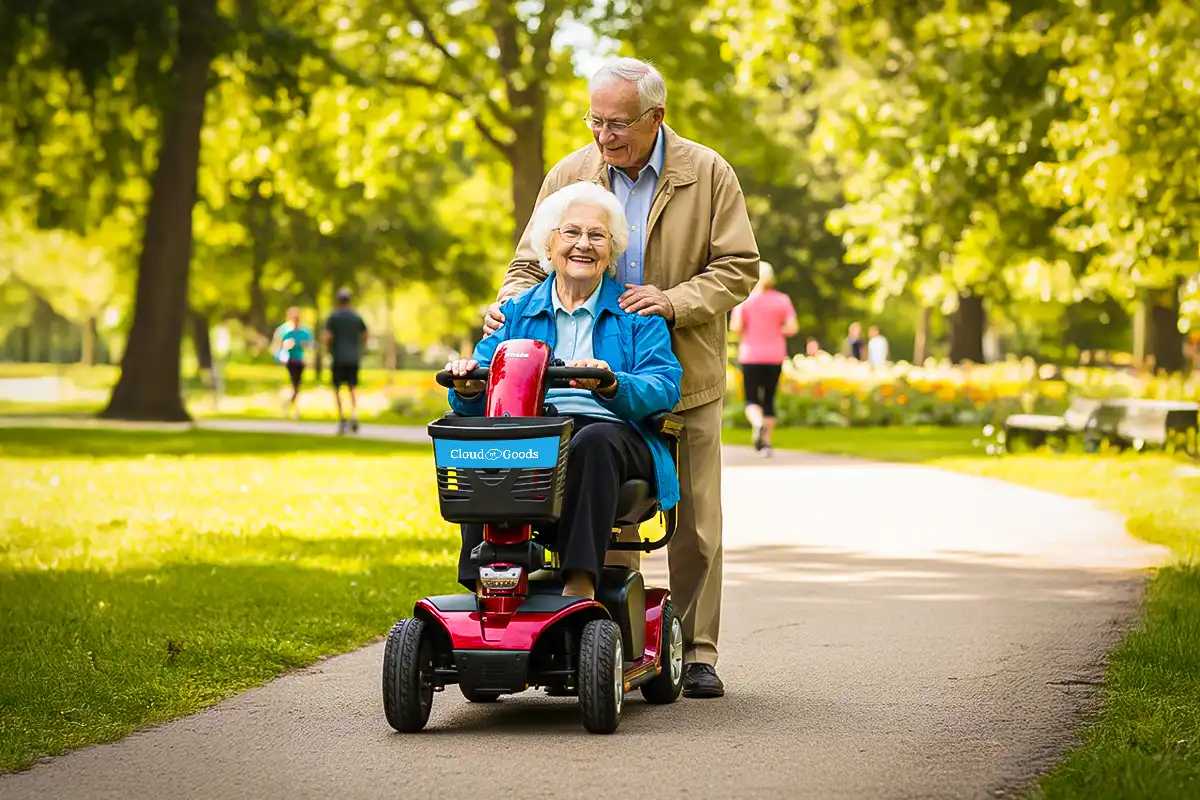Uma deficiência ou impedimento de qualquer tipo não deve limitar sua liberdade de explorar, ver o mundo ou visitar entes queridos. E como sabemos que pegar a estrada, embarcar em navios de cruzeiro ou pegar voos pode trazer algumas complicações extras quando a mobilidade é um problema e a acessibilidade está em jogo, elaboramos a Lista de Verificação Definitiva para Viagens com Deficiência em 2024 e além. Na Cloud of Goods, ajudamos você a se manter móvel em sua viagem com nossos opções de aluguel de mobilidade!
Viagens acessíveis permitem que pessoas com deficiência viajem para perto ou para longe para saciar sua sede de viajar ou manter contato com a família. Reserve sua viagem, faça as malas e prepare-se para uma aventura épica divertida, segura, fácil e sem complicações. Abaixo, você encontrará respostas para todas as suas perguntas sobre viagens para pessoas com deficiência.
Planejamento pré-viagem
Conheça seus direitos como viajante com deficiência
É seu direito ter igualdade de oportunidades de acesso para aproveitar suas viagens, assim como qualquer outra pessoa, com ou sem deficiência. Portanto, é evidente que, se você sentir que suas necessidades não estão sendo atendidas ou se sofrer qualquer discriminação durante uma viagem, não hesite em relatar uma preocupação ou registrar uma reclamação. A boa notícia é que o Departamento de Justiça lançou recentemente um formulário eletrônico de reclamação da ADA que permite que você denuncie violações online de forma rápida e fácil.
Oficialmente sancionada em 26 de julho de 1990 pelo então presidente George Bush, a Lei dos Americanos com Deficiências (ADA) exige que hotéis e outras acomodações aqui nos Estados Unidos tenham pelo menos dois quartos acessíveis equipados com recursos como portas mais largas, barras de apoio, grades de segurança no banheiro e móveis que permitam que cadeiras de rodas se movam livremente.
Aplicada pelo Departamento de Transportes dos EUA, a ADA estende seus regulamentos a navios de cruzeiro, garantindo acessibilidade para passageiros com deficiência. Grandes companhias de cruzeiro, como Royal Caribbean, Carnival e MSC Cruises, oferecem cabines acessíveis. Alguns navios, como o MSC Seaside, Norwegian Bliss e Disney Fantasy, são particularmente elogiados por suas acomodações. Para viagens aéreas, as companhias aéreas são legalmente obrigadas a auxiliar passageiros com deficiência no embarque, desembarque e voos de conexão, bem como auxiliar no manuseio de bagagens. Da mesma forma, a ADA se aplica a viagens de trem e ônibus, garantindo acessibilidade para passageiros com deficiência nesses meios de transporte. No entanto, você pode considerar entrar em contato com antecedência se tiver alguma necessidade específica, exigência ou solicitação específica, apenas para garantir que a empresa tenha tudo pronto para acomodá-lo.
Perguntas-chave a serem feitas sobre acessibilidade
- Para companhias aéreas: pergunte se o embarque prioritário é oferecido para viajantes com deficiência e se haverá assistência tanto no aeroporto durante as chegadas e partidas quanto no avião.
- Para linhas de cruzeiro: pergunte sobre a disponibilidade de cabines acessíveis e quaisquer instalações a bordo que atendam especificamente passageiros com deficiência, como rampas e elevadores.
- Para hotéis: pergunte se há um quarto compatível com ADA disponível para você fazer check-in e se a propriedade tem elevadores, portas automáticas, chuveiros acessíveis por cadeira de rodas e/ou portas extra largas.
Agências de viagens acessíveis
Quer saber se pessoas com deficiência têm desconto em viagens ou quer saber qual companhia aérea é melhor para viajantes com deficiência? Planejar viagens e férias como pessoa com deficiência pode ser complicado, especialmente se você precisa de uma scooter, andador ou cadeira de rodas para se locomover. É exatamente por isso que trabalhar com uma agência de viagens especializada em viagens acessíveis e inclusivas é uma ótima opção se a acessibilidade for uma preocupação. Agentes de viagens para pessoas com deficiência são profissionais que trabalham em estreita colaboração com propriedades e operadores que já foram pré-selecionados para acessibilidade, garantindo que seus clientes recebam assistência e acomodações adequadas para deficientes. Seu agente de viagens não só pode reservar voos e hotéis, mas também pode informá-lo sobre os melhores lugares para comer ou fazer compras como pessoa com deficiência. Se você planeja fazer algum passeio turístico, seu agente também deve ser capaz de lhe dizer quais atrações próximas são acessíveis. Eles realmente entendem do assunto.
Dicas de transporte
Viagens aéreas
- Reserve com antecedência: avise a companhia aérea com a qual você vai voar sobre qualquer assistência que possa precisar no aeroporto ou no avião. Ao reservar seu voo, você pode informá-los de que precisará de ajuda para embarcar, despachar malas e/ou se locomover no aeroporto.
- Considere o horário: é melhor escolher horários menos agitados para tornar sua experiência de viagem mais tranquila, relaxante e agradável. Sugerimos reservar voos no início da manhã ou no final da noite, fora dos horários de pico, para evitar o movimento do meio-dia.
- Relaxe e aproveite: voar pode ser estressante, independentemente de você ter ou não alguma deficiência. Recomendamos levar um livro, assistir a um filme no seu tablet ou ouvir um podcast para ajudar a passar o tempo durante o voo ou enquanto aguarda a chegada do seu voo.
Transporte terrestre
- Aproveite a tecnologia: Você sabia que aplicativos como Uber e Lyft costumam oferecer opções de transporte acessível? Viajantes com deficiência adoram esses aplicativos porque permitem que você acompanhe a chegada da sua viagem e se comunique diretamente com o motorista sobre quaisquer acomodações que você possa precisar.
- Obtenha descontos: A Amtrak Railways oferece 10% de desconto para passageiros adultos com deficiência. Pessoas com deficiência permanente podem até receber um passe vitalício gratuito para todos os Parques Nacionais dos Estados Unidos. Você pode obtê-lo online e pagar apenas uma taxa de processamento de US$ 10.
- Obtenha um RailCard: Se você for viajar pelo Reino Unido, certamente vai querer considerar a possibilidade de obter o seu Disabled Persons Railcard (cartão ferroviário para deficientes). Esses passes estão disponíveis gratuitamente para pessoas surdas e deficientes com deficiência visual, auditiva e outras deficiências físicas.
Navios de cruzeiro
- Escolha o navio certo: Nem todos os navios de cruzeiro são iguais. Se você é um passageiro com deficiência, procure navios que foram construídos ou reformados mais recentemente, pois navios mais novos ou modernizados tendem a oferecer melhores instalações para pessoas com deficiência. Celebrity Reflection, Carnival Horizon, Norwegian Sky e Mariner of the Seas, da Royal Caribbean, são apenas alguns dos navios de cruzeiro mais bem avaliados entre passageiros com deficiência.
- Conheça o layout: Circular por navios de cruzeiro exige paciência, portanto, certifique-se de se familiarizar com a localização dos elevadores em relação à sua cabine e aos locais que você planeja visitar com mais frequência, como as áreas de jantar, os locais de entretenimento, o balcão de atendimento e o cassino. Você deve poder pedir à equipe um mapa do navio que mostre exatamente onde os elevadores estão localizados ou consultar os que estão espalhados pelo navio.
- Utilize os recursos do navio: Os atendentes que trabalham no balcão de atendimento ao hóspede são muito prestativos na hora de providenciar assistência para embarque ou desembarque. Eles podem até ajudar você a reservar excursões, passeios ou atividades acessíveis para os dias em que o navio estiver no porto.
- Conecte-se com outras pessoas: O mais legal de um cruzeiro é que você pode conhecer, jantar e conviver com pessoas do mundo todo, com todos os tipos de hobbies, origens e interesses. Muitos cruzeiros hoje em dia oferecem até encontros para hóspedes com deficiência, onde eles podem compartilhar experiências, dicas e recomendações em um ambiente social descontraído.
Tecnologia e Aplicativos
Viajar com deficiência nunca foi tão conveniente, em parte devido à disponibilidade de aplicativos, ferramentas e sites de alta tecnologia. Estes são apenas alguns dos aplicativos móveis mais populares para viajar com deficiência.
- Wheelmap: Este aplicativo essencial para viagens com deficiência mapeia destinos acessíveis para cadeirantes em todo o mundo, cada um com uma classificação clara. Se você está procurando um restaurante, shopping ou museu acessível para deficientes para visitar, ele mostrará locais próximos. Como é gerado pelo usuário, você pode adicionar suas próprias descobertas para ajudar outras pessoas e também ver o que elas têm a dizer.
- Be My Eyes: disponível em mais de 180 idiomas, este aplicativo incrível conecta usuários cegos e com baixa visão a voluntários videntes que estão lá para fornecer assistência visual por meio de uma videochamada ao vivo. Você pode pedir aos ajudantes videntes que leiam placas ao se deslocarem em aeroportos, estações de trem, terminais de ônibus ou ruas movimentadas da cidade.
- Google Maps: Embora amplamente utilizado, muitas pessoas não sabem que o Google Maps possui recursos de rotas acessíveis que podem mostrar os melhores caminhos para quem usa cadeira de rodas ou precisa evitar escadas. Este aplicativo também fornece atualizações em tempo real sobre o transporte público, o que o torna uma ótima ferramenta para quem viaja com deficiência.
O que levar
Além de lenços umedecidos, desinfetante, um pequeno kit de primeiros socorros, livros e dispositivos digitais para entretenimento, há uma série de outras coisas que você deve levar para sua viagem.
Suprimentos médicos
Certifique-se de embalar o equipamento médico necessários para manter sua saúde, higiene e segurança quando estiver fora de casa. Isso inclui monitores de pressão arterial, medidores de glicose, nebulizadores portáteis, concentradores de oxigênio, fraldas geriátricas, suportes para pescoço e curativos.
Auxílios de mobilidade
Dependendo da natureza da sua deficiência, você pode precisar de um cadeira de rodas, bengala ou scooter de mobilidade para se locomover com segurança. Se não quiser se preocupar em trazer o seu de casa, você pode reservar seu aluguel de mobilidade conosco aqui na Cloud of Goods para sua maior comodidade.
Medicamentos
Você vai querer levar medicamentos suficientes para toda a duração da sua viagem, MAIS alguns dias extras, caso algo aconteça. Mantenha seus medicamentos na embalagem original e leve cópias das receitas para evitar problemas nos pontos de controle de segurança.
Documentação
Também é importante levar consigo um documento de seguro de viagem que detalhe informações sobre sua condição ou deficiência, forneça informações de contato do seu médico e liste todos os medicamentos que você esteja tomando. Certifique-se também de ter seu documento de identificação médica acessível durante a viagem.
Recursos de comunicação
Não se esqueça de levar também acessórios de assistência, como aparelhos auditivos ou dispositivos de saída de voz, para que você possa ouvir os outros e se comunicar de uma forma que eles entendam. Dispositivos compactos, leves e com bateria recarregável são ideais para viagens individuais ou com acompanhante.
Itens de conforto
Você provavelmente passará muito tempo sentado, então itens de conforto são essenciais. Estes incluem dispositivos especializados para alívio de pressão almofadas de assento, travesseiros ergonômicos de viagem, cobertores térmicos e outros itens que podem ajudar a tornar suas viagens como pessoa com deficiência muito mais confortáveis e convenientes.
E aí está, caro leitor... A Lista de Verificação Definitiva para Viagens com Deficiência! Graças a todas as dicas e informações contidas em nosso guia de viagens para pessoas com deficiência, você agora é um viajante mais bem equipado e preparado para tornar suas viagens nacionais ou internacionais, aéreas, rodoviárias ou marítimas, mais seguras, fáceis, inteligentes e confortáveis. Falando em tornar as coisas mais fáceis e eficientes em viagens, por que não aliviar sua carga sem comprometer a segurança ou a acessibilidade, reservando aluguéis de veículos de mobilidade com uma empresa conhecida por seu excelente atendimento ao cliente e ampla gama de opções? Nós, da Cloud of Goods, somos especializados em ajudar pessoas como você que desejam chegar ao seu destino com segurança, facilidade e conveniência, apesar de serem deficientes, incapacitadas ou com alguma deficiência.
Quer você esteja procurando alugar uma scooter de mobilidade, uma cadeira de rodas dobrável ou um concentrador de oxigênio portátil para viagens em altitudes mais elevadas, temos tudo o que você precisa para desfrutar de viagens seguras e felizes. Faça seu pedido online através do nosso site ou entre em contato por e-mail em info@cloudofgoods.com ou ligue para (+1)407-545-3103. Não há melhor momento do que agora para sair e tornar possível o que antes era impossível!












What do you think?
We value your feedback! Share your thoughts and ideas in the comments below.